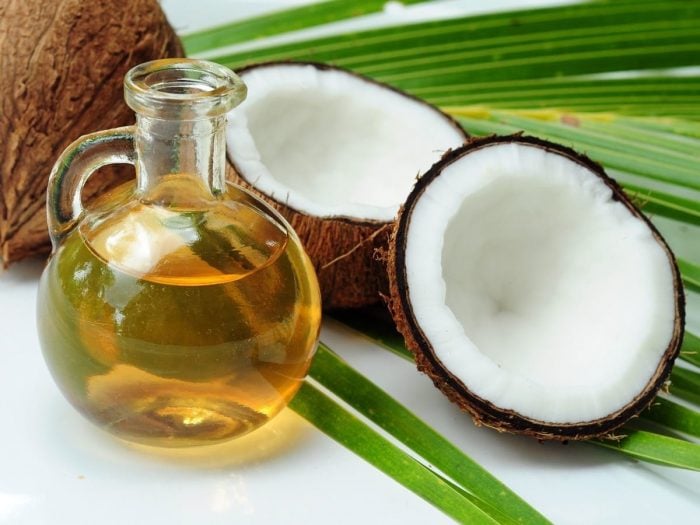In 2010 my mother, then 98 years old, became very depressed after the death of my father and brother. She was on Lexapro for the depression and It took almost 8 months for her to feel better. Unfortunately, the experience brought on severe dementia.
She fell and broke her hip January 2011
and recently after her 100th birthday she was hospitalized for gall
stones. Each visit to the hospital increased the symptoms of dementia
and delirium. She seldom had a night of uninterrupted sleep, she
repeatedly asked the same questions, she forgot some of the names of her
children, she obsessed about a bone growing in her mouth (there was no
bone), and the list goes on and on of hallucinations and delusions.
A friend recently emailed me a video of
Dr. Newport and her research of coconut oil on Alzheimer's. After
viewing it I went out to buy some coconut oil. I figured if it helps
Alzheimer’s patients, it should help someone with dementia.
I started her on 2 tablespoons Saturday,
March 31, 2012. I have seen such an improvement beginning with the
first day. She seldom repeats herself, she loves to listen to music and
dance. She has been remembering her past. She had not spoken of her
past since 2010. I heard her singing a song she used to sing
pre-depression. Once she goes to bed, she stays there until the
morning. I can tell by the blankets that she had a restful night.
Normally the blankets would be all over the place. One thing that has
changed drastically is she is now an early riser. This is a woman who
never wanted to get up earlier than 10 am. Now she’s up at 7:30 and
hungry.
I put the coconut oil in her oatmeal and
cook all her meals with it. I am very pleased with the changes in her.
Of course at 100 I don’t expect her to suddenly act like a 90 year old.
My mom is a very healthy woman with no serious diseases. I’m so glad to
see that now she can have conversations with friends and family.
UPDATE 4/30/2012
It has been 30 days since I started my
mom on coconut oil and I am thrilled to say that her dementia has
improved so much. She is a happy happy person now. She doesn’t want to
spend the day sleeping like she did pre-coconut oil. She is an early
riser and is ready for bed by 7:30 – 8:00 pm.
For 20+ years we have been gathering as a
family to spend a few hours praying and catching up. Mom has 3 living
sisters and none of them had seen her since our last gathering, March
17, 2012. We got together in my house on 4-28-12 and everyone was
surprised to see how alert mom was. She remembers her prayers without
the use of a book. She was funny and making jokes like she used to.
I am glad to say that everyone over the
age of 70 who was at this gathering has gone out to get some coconut
oil. They were very impressed with the changes they saw in my mother.
As a side note, I have cut back on the amount of coconut oil. I
started her out on 2 tablespoons but found that she had too much energy.
Although mom is healthy and walks ok, at 100 years of age, she is
limited in her activity. She takes 1 tablespoon which is sufficient to
see results. Plus, I cook everything with coconut oil now. Got rid of
all cooking oils, except olive oil and use only coconut oil. My advise
to anyone who has a elderly parent, get them started on coconut oil to
keep the dementia at bay.
OK so after reading this, I looked into coconut oil a bit more. lets just say this... Supper Food!
So read on...
The health benefits of coconut oil include hair care, skin care, stress relief, maintaining cholesterol levels, weight loss, increased immunity, proper digestion and metabolism, relief from kidney problems, heart diseases, high blood pressure, diabetes, HIV and cancer, dental care, and bone strength. These benefits of coconut oil can be attributed to the presence of lauric acid, capric acid and caprylic acid, and its properties such as antimicrobial, antioxidant, antifungal, antibacterial, soothing, etc.
How is Lauric Acid Used by our body?
The human body converts lauric acid into monolaurin which is claimed to help in dealing with viruses and bacteria causing diseases such as herpes, influenza, cytomegalovirus, and even HIV. It helps in fighting harmful bacteria such as listeria monocytogenes and heliobacter pylori, and harmful protozoa such as giardia lamblia. As a result of these various health benefits of coconut oil, though its exact mechanism of action was unknown, it has been extensively used in Ayurveda, the traditional Indian medicinal system. The Coconut Research Center has compiled various references on scientific research done on coconut oil.
Before we move on to the benefits of coconut oil in detail, let us understand its composition.
Composition of Coconut Oil:
Coconut oil consists of more than ninety percent of saturated fats (Don’t panic! First read to the last word. Your opinion may change), with traces of few unsaturated fatty acids, such as monounsaturated fatty acids and polyunsaturated fatty acids. Virgin Coconut Oil is no different from this. Let us have a bit detailed study of this.- The Saturated Fatty Acids: Most of them are Medium Chain Triglycerides, which are supposed to assimilate well. Lauric Acid is the chief contributor, with more than forty percent of the share, followed by Capric Acid, Caprylic Acid, Myristic Acid and Palmitic.
- The Polyunsaturated Fatty Acids: Linoleic Acid.
- The Monounsaturated Fatty Acids: Oleic Acid.
- The Poly-phenols: Gallic Acid, which is phenolic acid. These poly-phenols are supposed to be responsible for the fragrance and the taste of Coconut Oil and Virgin Coconut Oil is rich in these poly-phenols.
- Certain derivatives of fatty acid like Betaines, Ethanolamide, Ethoxylates, Fatty Esters, Fatty Polysorbates, Monoglycerides and Polyol Esters.
- Fatty Chlorides, Fatty Alcohol Sulphate and Fatty Alcohol Ether Sulphate, all of which are derivatives of Fatty Alcohols.
- Vitamin-E and Vitamin K and minerals such as Iron.

Let us now explore the benefits of coconut oil in detail:

Hair Care:
Coconut oil is one of the best natural nutrition for hair. It helps in healthy growth of hair providing them a shiny complexion. Regular massage of the head with coconut oil ensures that your scalp is free of dandruff, lice, and lice eggs, even if your scalp is dry. Coconut oil is extensively used in the Indian sub-continent for hair care. Most of the people in these countries apply coconut oil on their hair daily after bath. It is an excellent conditioner and helps in the re-growth of damaged hair. It also provides the essential proteins required for nourishing damaged hair. It is therefore used as hair care oil and used in manufacturing various conditioners, and dandruff relief creams. Coconut oil is normally applied topically for hair care.Skin Care:
Coconut oil is excellent massage oil for the skin as well. It acts as an effective moisturizer on all types of skins including dry skin. The benefit of coconut oil on the skin is comparable to that of mineral oil. Further, unlike mineral oil, there is no chance of having any adverse side effects on the skin with the application of coconut oil. Coconut oil therefore is a safe solution for preventing dryness and flaking of skin. It also delays wrinkles, and sagging of skin which normally become prominent with age. Coconut oil also helps in treating various skin problems including psoriasis, dermatitis, eczema and other skin infections. Therefore coconut oil forms the basic ingredient of various body care products such as soaps, lotions, creams, etc., used for skin care. Coconut oil also helps in preventing premature aging and degenerative diseases due to its antioxidant properties.Heart Diseases:
There is a misconception spread among many people that coconut oil is not good for the heart. This is because it contains a large quantity of saturated fats. However, coconut oil is beneficial for the heart. It contains about 50% lauric acid, which helps in preventing various heart problems including high cholesterol levels and high blood pressure. The saturated fats present in coconut oil are not harmful as it happens in case of other vegetables
oils. It does not lead to increase in LDL levels. It also reduces the
incidence of injury in arteries and therefore helps in preventing
atherosclerosis.
The saturated fats present in coconut oil are not harmful as it happens in case of other vegetables
oils. It does not lead to increase in LDL levels. It also reduces the
incidence of injury in arteries and therefore helps in preventing
atherosclerosis.Weight Loss
Coconut oil is very useful in reducing weight. It contains short and medium-chain fatty acids that help in taking off excessive weight. It is also easy to digest and it helps in healthy functioning of the thyroid and enzymes systems. Further, it increases the body metabolism by removing stress on pancreases, thereby burning out more energy and helping obese and overweight people reduce their weight. Hence, people living in tropical coastal areas, who eat coconut oil daily as their primary cooking oil, are normally not fat, obese or overweight.Digestion
Internal use of coconut oil occurs primarily as cooking oil. Coconut oil helps in improving the digestive system and thus prevents various stomach and digestion related problems including irritable bowel syndrome. The saturated fats present in coconut oil have anti microbial properties and help in dealing with various bacteria, fungi, parasites, etc., that cause indigestion. Coconut oil also helps in absorption of other nutrients such as vitamins, minerals and amino acids.Immunity:
Coconut oil is also good for the immune system. It strengthens the immune system as it contains antimicrobial lipids, lauric acid, capric acid and caprylic acid which have antifungal, antibacterial and antiviral properties. The human body converts lauric acid into monolaurin which is claimed to help in dealing with viruses and bacteria causing diseases such as herpes, influenza, cytomegalovirus, and even HIV. It helps in fighting harmful bacteria such as listeria monocytogenes and heliobacter pylori, and harmful protozoa such as giardia lamblia.Healing and Infections
When applied on infections, it forms a chemical layer which protects the infected body part from external dust, air, fungi, bacteria and virus. Coconut oil is most effective on bruises as it speeds up the healing process by repairing damaged tissues.Infections: Coconut oil is very effective against a variety of infections due to its antifungal, antiviral, and antibacterial properties. According to the Coconut Research Center, coconut oil kills viruses that cause influenza, measles, hepatitis, herpes, SARS, etc. It also kills bacteria that cause ulcers, throat infections, urinary tract infections, pneumonia, and gonorrhea, etc. Coconut oil is also effective on fungi and yeast that cause candidiasis, ringworm, athlete's foot, thrush, diaper rash, etc.
Other:
Liver: The presence of medium chain triglycerides and fatty acids helps in preventing liver diseases as they substances are easily converted into energy when they reach the liver, thus reducing work load on the liver and also preventing accumulation of fat.Kidney: Coconut oil helps in preventing kidney and gall bladder diseases. It also helps in dissolving kidney stones.
 Pancreatitis: Coconut oil is also believed to be useful in treating pancreatitis.
Pancreatitis: Coconut oil is also believed to be useful in treating pancreatitis.Stress Relief: Coconut oil is very soothing and hence it helps in removing stress. Applying coconut oil to the head followed with a gentle massage helps in removing mental fatigue.
Diabetes: Coconut oil helps in controlling blood sugar, and improves the secretion of insulin. It also helps in effective utilization of blood glucose, thereby preventing and treating diabetes.
Bones: As mentioned earlier, coconut oil improves the ability of our body to absorb important minerals. These include calcium and magnesium which are necessary for development of bones. Thus coconut oil is very useful to women who are prone to osteoporosis after middle age.
Dental Care: Calcium is an important element present in teeth. Since coconut oil facilitates absorption of calcium by the body, it helps in getting strong teeth. Coconut oil also stops tooth decay.
HIV and Cancer: It is believed that coconut oil plays an instrumental role in reducing viral susceptibility of HIV and cancer patients. Preliminary research has shown indications of the effect of coconut oil on reducing the viral load of HIV patients (Reference).
Finally, coconut oil is often preferred by athletes and body builders and by those who are dieting. The reason behind this being that coconut oil contains lesser calories than other oils, its fat content is easily converted into energy and it does not lead to accumulation of fat in the heart and arteries. Coconut oil helps in boosting energy and endurance, and enhances the performance of athletes.
Coconut Oil and Alzheimer's Disease: There are reports of research conducted by Dr. Newport stating that coconut oil is useful for treating Alzheimer's disease. Apart from this there is no scientific evidence or traditional knowledge or coconut oil being used for treating Alzheimer's. It was also not known traditionally that coconut oil helps in the brain function.
Why is Coconut Oil Solid?: Unlike most other oils, coconut oil has a high melting point - about 24 to 25 degress Celcius or 76-78 Farenheit. Therefore it is solid at room temperature and melts only when the temperatures go high. Hence, if you buy a bottle of coconut oil and find it solid, don't think that there is some problem with it. Coconut oil is like this only. And of course, don't keep it in your refrigerator.
How to Use Coconut Oil?: If you are using coconut oil for topical purposes, especially hair care, just melt the oil (if it is solid) by keeping the bottle in the sun or warm water. You can also take some coconut oil out and put it in a small bowl and heat the bowl over a flame (do not use microwave). Then take the oil on your palm and apply it to your hair. If you want to use it for internal consumption, simply replace butter or vegetable oils with coconut oil in your recipes. Remember, you need not switch to coconut oil completely, as you will miss the benefits of other oils and dairy products.
Can I Use Coconut Oil for Cooking?: Yes, in most of the tropical coastal regions, people use coconut oil for cooking.
 I Don't Like the Taste of Coconut Oil. What Should I do?:
Try using coconut oil in some different recipe. That may help. If you
get nauseated after eating coconut oil, don't force yourself. As it
happens with any other food item, your body may be allergic to coconut oil and it is best not to consume it.
I Don't Like the Taste of Coconut Oil. What Should I do?:
Try using coconut oil in some different recipe. That may help. If you
get nauseated after eating coconut oil, don't force yourself. As it
happens with any other food item, your body may be allergic to coconut oil and it is best not to consume it.I say try Pie!
This article is written by Kiran Patil

that is awesome!
ReplyDeleteMy wife didn't like the taste and to be frank neither did I so here's what I did. I mixed the oil with some lemon curd (available in any market) and some cranberry/orange salad from the deli.
ReplyDeleteI combined well and spread on half a plain bagel or crisp wafer and heated just a little to warm and get a melt. Taste like a high end pastry. Wife now considers it dessert.
About a week into this and I think I see some improvement already. Time will tell.
WPK